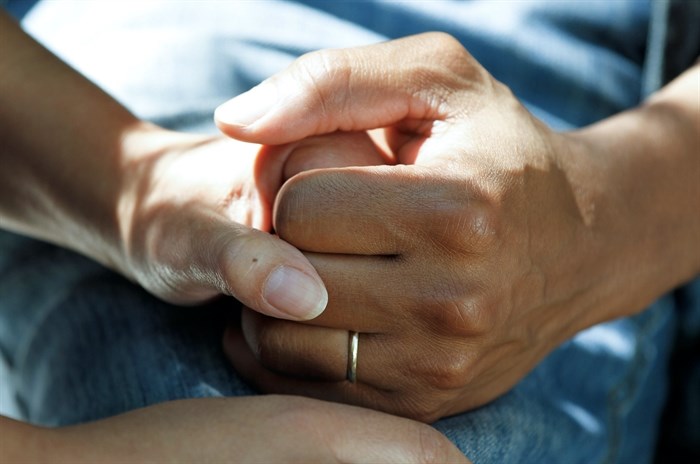
FILE PHOTO
Image Credit: UNSPLASH
January 29, 2024 - 6:00 AM
A woman in Revelstoke is fighting for her right to medical assistance in dying after watching her dad’s long and traumatic death to Lewy body dementia, a neurological dementia disorder that affects older adults.
Tanya Secord said death from dementia is cruel. She watched as her father went from happy and adjusted to frightened, angry and aggressive, tormented by hallucinations for over three years until he died in 2022.
“(He thought) people were coming through his walls, he was in plane crashes, he was watching his own dad fall off balconies,” she said. “Watching my dad go through this was filled with heartache, frustration, anxiety and fear.”
While medical assistance in dying, or MAID, is available for those with a variety of terminal health conditions in Canada, it isn’t yet accessible to those suffering solely from cognitive health declines, and advance requests for the procedure are not legal.
Secord is advocating to change those laws. She, along with her sisters, want to set up MAID in advance with their doctors, in case they get dementia too.
“We don’t want to die like our dad did and put our families through the same horrific ordeal,” she said. “We don’t want to be put into a long-term care facility not knowing who we are. We don’t want to be a burden on our families.
“Dementia is a debilitating disease that forces people to live in an unacceptable and inhumane way.”
Someone diagnosed with dementia can be eligible for MAID but they need the capacity to understand their request and significant cognitive decline can happen before the final approval for MAID. Each patient is assessed on a case by case basis, but timing is key with dementia diagnoses.
In Secord’s dad’s case, he wasn’t considered functioning cognitively well enough to choose MAID by the time he was diagnosed.
“People with dementia don’t know how sick they are, they don’t know it’s happening,” she said. “It took us a year to convince him to go to a doctor, by that time it was too late for him to give consent.”
Secord wants advance requests to be made legal so when a person is still able to consent, their wishes for dying are honoured after they lose the ability to make decisions for themselves.
“I can’t be asking for assisted dying at the point when I don’t remember my family, when I can no longer stay home and be safe and my family is safe from me so I have to go to long-term care,” she said. “That would be my trigger point.”
Medical assistance in dying allows someone who meets eligibility requirements to end their life with the assistance of a medical practitioner, but only under specific circumstances and rules under the federal Criminal Code according to Canadian government. Only medical practitioners are allowed to do assessments and provide the service.
READ MORE: Kelowna residents use their own recovery to help others on rail trail
MAID was first legalized in Canada in 2016 after a Supreme Court of Canada ruling said people with irremediable medical conditions should have the right to ask a doctor to help them die.
The legislation was revised in 2021 to allow the procedure to people who are suffering but not close to dying. It decreased the number of witnesses needed and allowed some procedures to be carried out if a person cannot consent immediately before death.
READ MORE: Kamloops woman frustrated after finding homeless man freezing overnight
There was a push to extend the allowances further to include those suffering solely from a mental illness who meet all the eligibility criteria to get the procedure, but in 2023 that was pushed back a year to March, 2024 for further review, and advanced requests are still illegal.
The topic of medical assistance in dying is controversial.
“People think I’m a horrible person for wanting this,” Secord said. “Everyone is entitled to their own choice and opinion. If you're against this for political or religious reasons that’s OK but get out of the way of people who want it. Until you see what dementia does to your loved one its hard to understand how traumatizing it is.”
READ MORE: Public barred from Vernon school board meetings after protest
She said the only alternative to assisted dying is suicide timed in advance of diminishing cognitive function, which can go sideways and affect other people badly.
Secord’s dad passed away in 2022.
She has been in contact with government representatives and is on a list to go to Ottawa if an opportunity to speak to the federal government on the issue arises. She is encouraging others who want advanced requests for MAID to be legal to fill out a petition here.
— This article was corrected at 12 p.m. Monday, Feb. 5, 2024, to say a waiver of final consent became available in 2021 to remove the requirement that a dementia patient give consent for MAID immediately before death.
To contact a reporter for this story, email Shannon Ainslie or call 250-819-6089 or email the editor. You can also submit photos, videos or news tips to the newsroom and be entered to win a monthly prize draw.
We welcome your comments and opinions on our stories but play nice. We won't censor or delete comments unless they contain off-topic statements or links, unnecessary vulgarity, false facts, spam or obviously fake profiles. If you have any concerns about what you see in comments, email the editor in the link above. SUBSCRIBE to our awesome newsletter here.
News from © iNFOnews, 2024